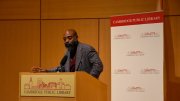“I’m going to tell you three stories,” said Reginald Dwayne Betts to listeners at the Cambridge Public Library Tuesday evening, at the start of remarks honoring Martin Luther King Jr. A Harvard visiting lecturer in English, Betts is a poet, practicing attorney, and the founder and CEO of Freedom Reads, an organization that builds libraries in prison cell blocks across the country—more than 300 so far. Betts is himself a former inmate: at 16, he went to prison for carjacking and spent almost nine years behind bars. That experience made him a writer and has shaped his life and work ever since. On the day he spoke, Harper Collins released a new commemorative edition of King’s Letter from a Birmingham Jail, with an afterword by Betts.
His lecture—a deeply personal, digressive meditation on hope, despair, second chances, and what it means to live a good life—contained much more than the three stories Betts had promised. He recalled the tears he’d cried in prison: once, when he went to court for the first time and realized he wouldn’t be going home; and again a year later, during a Martin Luther King holiday, when he was suddenly overwhelmed with the feeling that he had wasted his life. It took him a long time, he said, to see his situation differently, to appreciate the untold stories of teaching and care and “random acts of kindness” that go on among people in prison.
“What does it mean to try to contribute?” he said. “I’ve thought about what we were all trying to do, to be more than whatever landed us in prison. And I've come to step back and think about the deep, deep, deep value in that….So many of my friends are still in prison. If I am only valued for what I’ve done while I’m free, what does it mean about the lives that they have been living all of these years? And what does it mean about those dudes before us, many of whom have died, but who did things while I was inside that kept me safe—and if nothing else, kept my mind interested in being something other than somebody who was in prison? Which is to say, we recognized that even inside, we were more than somebody who was in prison.”
Betts spoke about his mother, and the responsibility she felt for his crime and the hardships she suffered while he was locked up; and about the family he built after his 2005 release from prison, a wife and son. He recalled attending a Martin Luther King Day church service not long after he’d returned home. “One of the beauties of the legacy of Dr. Martin Luther King Jr.,” he said, “is that it meets you where you are….You go to the legacy of Dr. Martin Luther King when you find yourself incapable of speaking eloquently; you go to the legacy of Dr. Martin Luther King Jr. to remind yourself that there are possibilities for you in improving. When you feel good about yourself, you go to the legacy. When you feel bad about yourself, you go to the legacy.”
His closing recollection was of a recent trip to the Legacy Museum and National Memorial for Peace and Justice in Montgomery, Alabama, sites that commemorate the 4,000 African Americans who were lynched between 1877 and 1950. (The sites’ creation was led by Bryan Stevenson, J.D.-M.P.A.’85, LL.D. ’15, founder and executive director of the Equal Justice Initiative.) At the memorial (designed by MASS Design), the names of lynching victims are engraved on Corten Steel monuments suspended overhead, which look, Betts said, “like they’re falling from the sky.”
Afterward, he took an Uber to the Edmund Pettus Bridge, in Selma, and walked across it in a downpour, barefoot and sobbing, thinking of King and the other marchers in 1965, “an entire spectrum of humanity, arms interlocked, walking towards snarling, towards hate, towards vengeance.” On that day too, Betts noticed the people who quietly cared for him: the Uber driver, a woman with whom he’d formed an instant connection and then trusted to hold onto his expensive new sneakers and coat while he walked, so they didn’t get wet; and a couple crossing the bridge behind him, who saw his distress stopped to make sure he was OK. Those interactions gave him a sense of belonging that he still sometimes lacks, Betts said. Because of his criminal record, “I often feel segregated from the beloved community,” he noted, invoking King’s vision of a peaceful, happy, equitable society. “What I felt in that car was a kind of kinship that was deeply beyond and removed from some notion of prison being the thing that determines why somebody cares about me.”
A few minutes later, during the Q&A, he returned to this idea. An audience member asked Betts about Freedom Reads, and he told a story about one of the organization’s employees, a man who was incarcerated for 30 years; 15 months after his release, he began going back into prisons to help build bookshelves and furniture for the new libraries, and to help carry in books. “Ultimately, it’s about telling a story,” Betts said. He was talking about the organization’s work, but his point was also bigger than that. “It’s the stories that will create the tide that makes us look at each other differently. And all of us [at Freedom Reads] believe that there’s a possibility of a beloved community that those of us who have been excommunicated, even for worthy reasons, might return to.”









